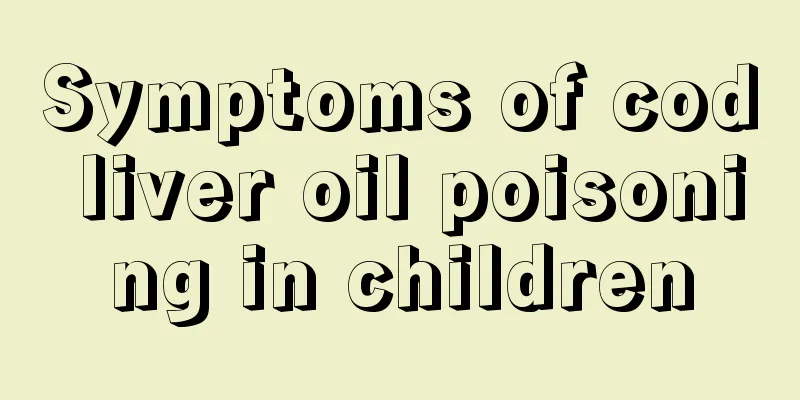Why do I have frequent and painful urination?

|
Frequent and painful urination is a condition that many men and women experience in their daily lives. It seriously affects people's normal life. But what exactly causes people to experience frequent and painful urination? In fact, this is related to the following 5 reasons. The first reason is the large amount of urine. 1. Causes of frequent and painful urination 1. Increased urine volume: When urine volume increases, the frequency of urination will also increase accordingly. Under physiological conditions, such as drinking a lot of water, eating watermelon, and drinking beer, due to the increase in water intake, the urine volume increases through the regulation and filtration of the kidneys, and the frequency of urination also increases, resulting in frequent urination. Under pathological conditions, such as some patients with diabetes and diabetes insipidus, they drink a lot of water, urinate a lot, and urinate frequently. But there was no discomfort in urination. 2. Inflammatory stimulation: When there is inflammation in the bladder, the nerve perception threshold is lowered, the urinary center is in an excited state, resulting in frequent urination and reduced urine volume (<300-500 ml/time in adults). Therefore, frequent urination is an important symptom of cystitis, especially in acute cystitis and tuberculous cystitis. Other conditions such as prostatitis, urethritis, pyelonephritis, chronic balanoposthitis in children, vulvitis, etc. can also cause frequent urination. Under the stimulation of inflammation, frequent urination, urgency and pain often occur at the same time, which is called urinary tract irritation syndrome, commonly known as "triuria". 3. Non-inflammatory stimulation: such as urinary stones and foreign bodies, usually with frequent urination as the main manifestation. 4. Reduced bladder capacity: such as bladder space-occupying lesions, compression from the enlarged uterus during pregnancy, tuberculous bladder contracture, or large bladder stones. 5. Psychoneural frequent urination: Frequent urination only occurs during the day or before falling asleep at night. It is often caused by mental tension or occurs in patients with hysteria. This may also be accompanied by urinary urgency and pain. 2. Diagnostic characteristics of frequent urination and painful urination 1. If there is obvious pain at the beginning of urination or dysuria, the lesion is mostly in the urethra, which is common in acute urethritis. 2. Pain at the end of urination and urgency are common in patients with acute cystitis. 3. If there is obvious pain at the end of urination, the pain is still felt after urination, or there is a feeling of "empty pain", or the pain is felt even without urination, the lesions are mostly in the urethra or adjacent organs, such as bladder trigone inflammation, prostatitis, etc. 4. Sudden interruption of urination accompanied by pain or urinary retention: seen in bladder, urethral stones or foreign bodies in the urinary tract. 5. Difficult urination accompanied by distension and pain: This often indicates prostate hyperplasia in elderly men and can also be seen in urethral stones. 6. Stinging or burning pain during urination: This is common in acute inflammatory stimulation, such as acute urethritis, cystitis, prostatitis, and pyelonephritis. 3. Prevention, health care and precautions for frequent urination and painful urination: 1. Reduce mental and work stress. 2. Do not drink alcohol or drink less alcohol, and eat less spicy food. 3. Reduce greasy food and unsaturated fatty acids. 4. Eliminate inducements, exercise more, and avoid sitting for long periods of time or riding a bike for long periods of time. 5. Prevent pathogens from infecting the prostate through various means. 6. Eat more vegetables and fruits high in lycopene. |
<<: What causes headaches, nausea, vomiting and sweating?
>>: What are the symptoms of limb arterial embolism?
Recommend
The hazards of excessive arsenic
Arsenic overload is very harmful to human health....
Can sweat steaming cure arthritis
There are many patients with arthritis in life. I...
What fruits can I eat for antral gastritis
Antral gastritis is a disease that troubles many ...
The disadvantages of sleeping late
For the sake of physical health, we must develop ...
What medicine is used for tropical candida
If you are infected with tropical Candida albican...
What to do if your toe is bruised?
It is said that the fingers are connected to the ...
The following are some methods to prevent bladder cancer
To prevent bladder cancer, you must pay attention...
How to clean pipe scale
Now every household has pipes, even outside. Espe...
Can overnight sugarcane be eaten
When people eat sugarcane, they must be attracted...
About the nursing measures for patients with lymphoma
For lymphoma patients, they not only need hospita...
Why is coughing up blood bright red
Coughing up blood is an abnormal condition, which...
What's wrong with the black intestines
Gastrointestinal diseases are very common around ...
Why are men more likely to develop liver cancer? How can men protect their livers and prevent liver cancer?
As the backbone of the family, men's health i...
What are the treatments for brain cysticercosis
Brain cysticercosis is common among young people....
Why does your face turn yellow if you wash it with calendula water for a long time?
Calendula, also known as Marigold, is a relativel...









